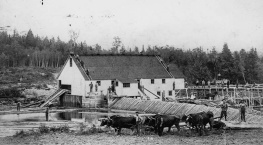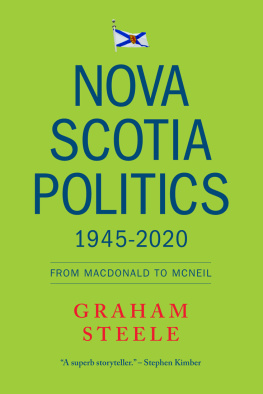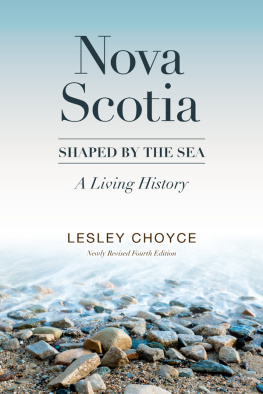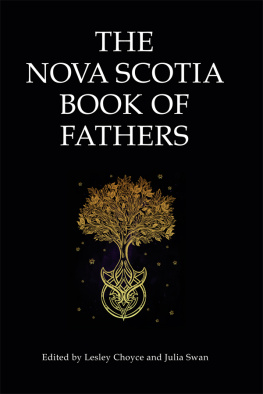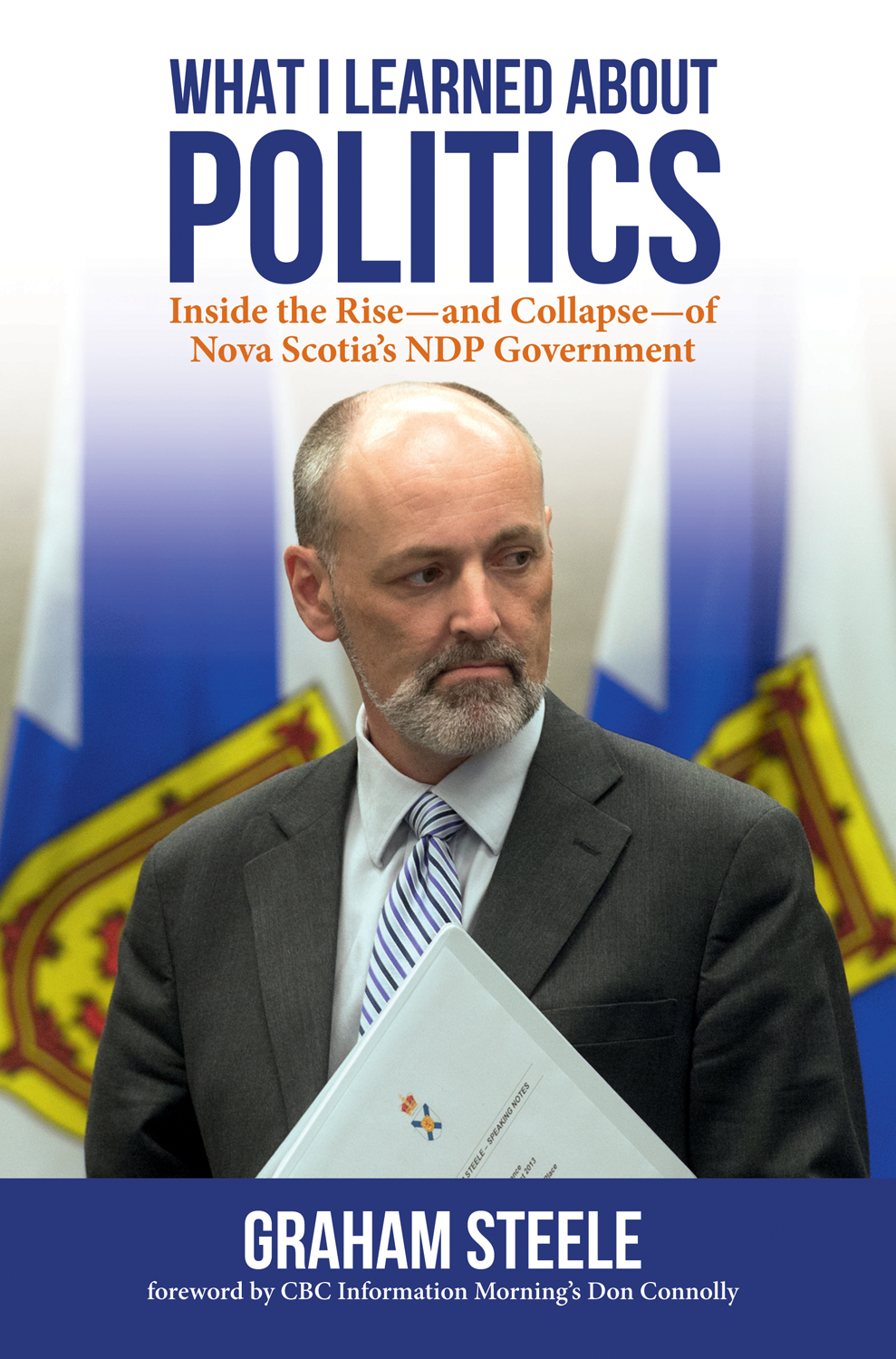Copyright 2014 , Graham Steele
All rights reserved. No part of this book may be reproduced, stored in a retrieval system or transmitted in any form or by any means without the prior written permission from the publisher, or, in the case of photocopying or other reprographic copying, permission from Access Copyright, Yonge Street, Suite 1900 , Toronto, Ontario, M5E 1E5 .
Nimbus Publishing Limited
3731 Mackintosh St, Halifax, NS B3K 5A5
( ) - 4286 nimbus.ca
Printed and bound in Canada
NB 1148
Cover photo: Courtesy of the Halifax Herald Limited
Design: John van der Woude Designs
Library and Archives Canada Cataloguing in Publication
Steele, Graham, author
What I learned about politics : inside the riseand collapseof Nova Scotias NDP government / Graham Steele.
Issued in print and electronic formats.
ISBN 978-1-77108-210-5 (pbk.).ISBN 978-1-77108-211-2 (html).
1. Steele, Graham. 2. PoliticiansNova ScotiaBiography. 3. Nova Scotia New Democratic PartyBiography. 4. ElectionsNova Scotia. 5. Nova ScotiaPolitics and government1999-2009. I. Title.
JL229.A8N69 2014 324.2716072092 C2014-903180-7
C2014-903181-5
Nimbus Publishing acknowledges the financial support for its publishing activities from the Government of Canada through the Canada Book Fund ( CBF ) and the Canada Council for the Arts, and from the Province of Nova Scotia through Film & Creative Industries Nova Scotia. We are pleased to work in partnership with Film & Creative Industries Nova Scotia to develop and promote our creative industries for the benefit of all Nova Scotians.
For my boys, Deivan and Kiran.
Remember all those mornings I got up so early?
This is what I was writing.
Remember all those times I was away when you were
growing up? Thats what Im writing about.
And for Tilly, who put up with a lot so it could happen.
CONTENTS
Foreword
The history teacher in front of the class of bright little faces warned the young people time and again: Theres nothing so uncertain as a dead sure thing. It was advice offered very long ago in a small town in northern New Brunswick. I was one of those little faces and much as I took it to heart, I didnt always heed it.
Which brings us to a few events in modern Nova Scotia politics.
Surely Vince MacLeans Liberals will easily crush an old, tired, and discredited John Buchanan-led Conservative party.
Surely health care reform in Nova Scotia will finally move forward with Dr. John Savage recruiting a brilliant, native-born, and internationally renowned physician, Dr. Ron Stewart, to formulate and enact the changes.
Surely there will be a seamless transition of power from a much-admired Tory premier, John Hamm, to his most able cabinet minister and longtime finance minister Neil LeBlanc.
And then there was the coming of the New Jerusalem. After a long struggle, the New Democratic Party, under the leadership of a moderate, avuncular Darrell Dexter, was set to do politics differently in Nova Scotia. On June , 2009 , the electorate gave the party a mandate only its most starry eyed acolytes could have dreamed of twenty years before.
There is nothing as uncertain as a dead sure thing.
In this book Graham Steele not only explains how things came undone, but he says that on the night the party faithful celebrated victory, the seeds for their fall had already been planted.
As the finance minister for this new government, Grahams perspective on this is unique. He points out in the book that a governments real priorities are not to be found in campaign literature or in stump speeches. You must follow the money. What a government believes in, what it cares about, what it really stands for, can be understood by what it does and doesnt spend (our) money on.
Graham refers in the book to the iron grip of the status quo. He refers here to the immense difficulty of finding new ways to operate any government. Where do you find programs and projects to defund so that new and hopefully better ones can be supported? In opposition, you might naively think you can comb through departmental budgets and find enough loose change to make a big difference. It just aint so.
And new finance ministers very quickly realize that things are worse than the previous government led the citizens to believe. Such realities lead governments to look at subsidies for a Yarmouth ferry as a nice little chunk of change that could be spent better elsewhere. How did that one work out for you?
Most books about politics are written by academics, reporters, or politicians who come at the Art of the Possible from an angle different than Steele. A conventional book about this period in Nova Scotia might be expected to have more of the personal and anecdotal. It would contain more stories of the people and the strange tribal loyalties that make politics as interesting as it is in the province.
Graham does not shy from any discussion of personalities. He discusses his relationship with Premier Dexter, in all its complexities. He very clearly understands the unique duality within the party. There may have been Conservatives loyal to Neil LeBlanc and others faithful to Rodney MacDonaldthats a temporary thing. Many Liberals loyal to Jim Cowan (who lost the leadership to Vince MacLean) sat out the next election, which greatly helped John Buchanan win a third term. Most of these Liberals have gotten over that.
Graham understands and explains very well the struggle between the political pragmatists like Dexter and those longtime supporters of the party like Howard Epstein who espouse a more traditional social democratic line.
The choice not to focus on personalities and the everyday cut and thrust at the House or on the hustings gives Graham greater scope to look at areas and issues that a political scientist or political reporter might not care about as muchand could never understand without the benefit of having been an elected politician, never mind a senior cabinet minister.
Graham provides a detailed series of chapters that amount to a how of politics, not just here is Nova Scotia but just about anywhere else where a comparable system is in place. And trust me on this, it isnt always pretty. This is where the bit about not wanting to know how sausages and laws are made might be invoked.
One of the most interesting and insightful aspects of the book is Grahams personal journey into and out of active politics.
My grandfather was an MLA in New Brunswick for twenty-nine years. In his house, in our house, and all around the town, we talked partisan politics. The experience led to a lifelong love of the game and it inoculated me against any fever that might prompt me to seek public office.
Steele didnt come from an experience like that, and we as readers of the book are better for it. There isand I mean this in the most positive sensea bit of Mr. Smith Goes to Washington in Graham. (He even looks a little like a young James Stewart.) He went into the game for the right reasons, he tried to do the right thing(s), and he left for perfectly sound reasons about which he is both honest and forthcoming. His book is part memoir, part manual, and part cautionary tale.
Don Connolly
Information Morning
CBC Radio
Preface
How do you learn to be a politician?
Theres no school, no textbook, no user guide.
You can learn from politicians with more experience. But all political lives end in failure so the saying goes so you would be learning from failures, or people on their way to becoming failures.
Besides, theres a culture of secrecy around politics. Failures dont like to admit their failings. Loyalty is rated more highly than truth-telling. A good part of politics is deal-making, and it might be hard to explain what got traded for what. Some of what politicians do or dont do can be explained only by laziness and ignorance, and who wants to admit to that?


